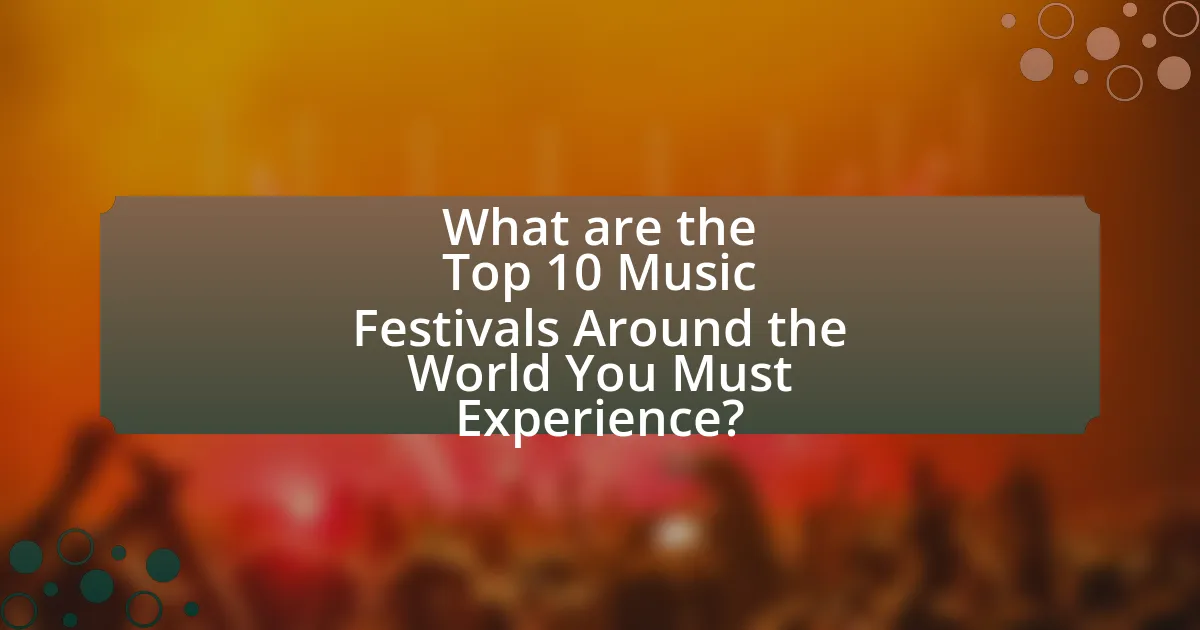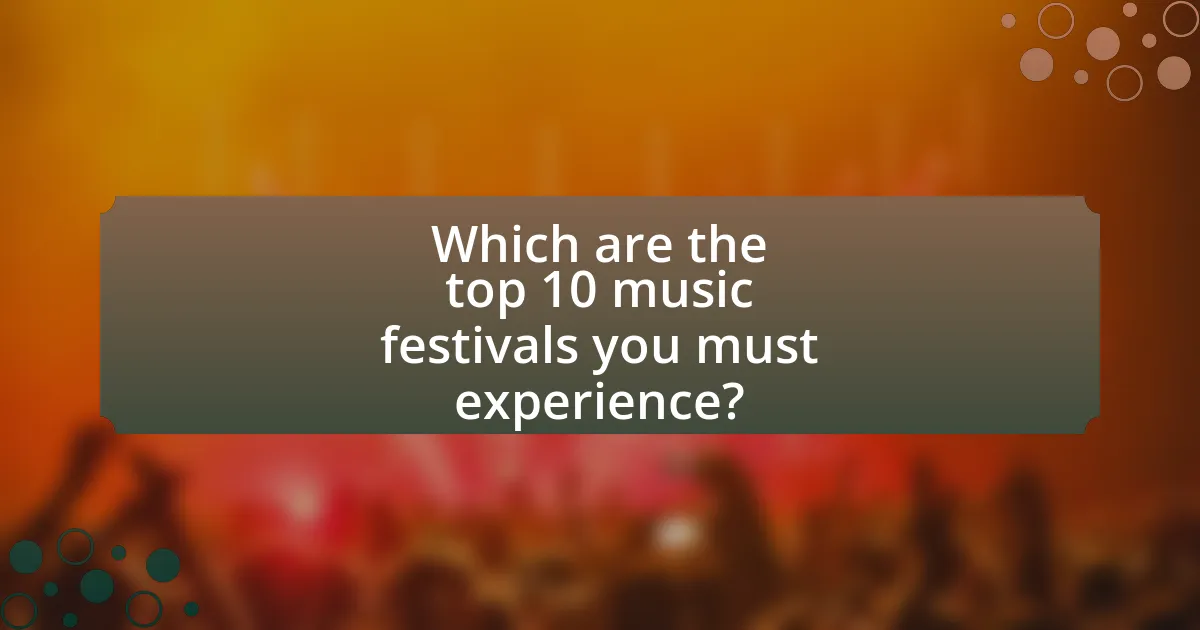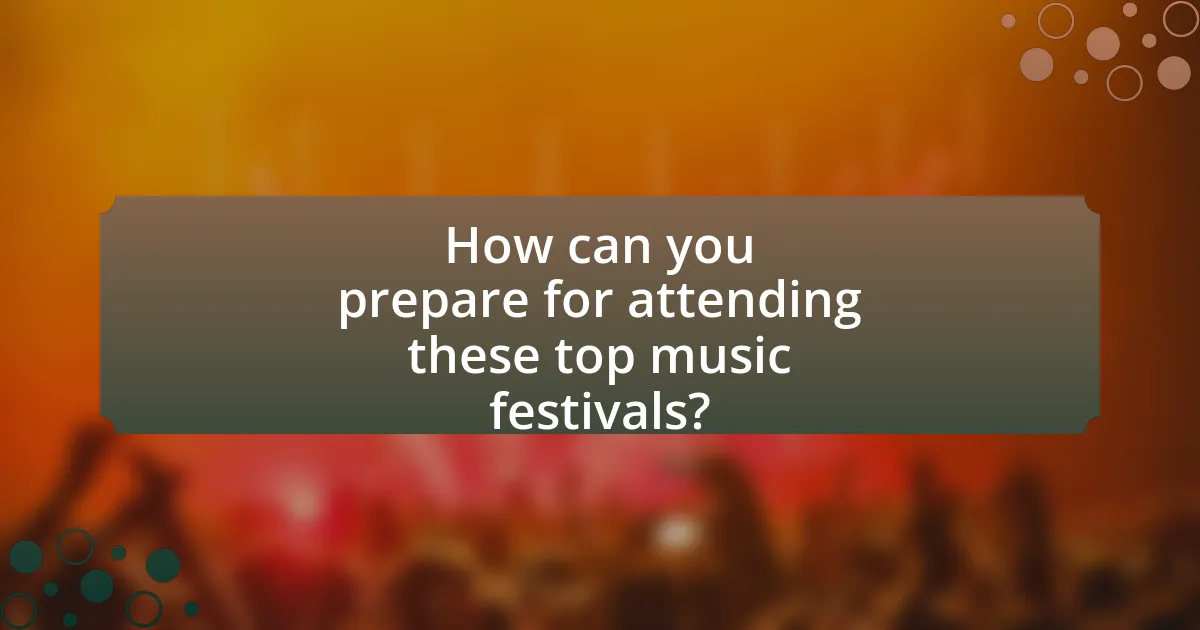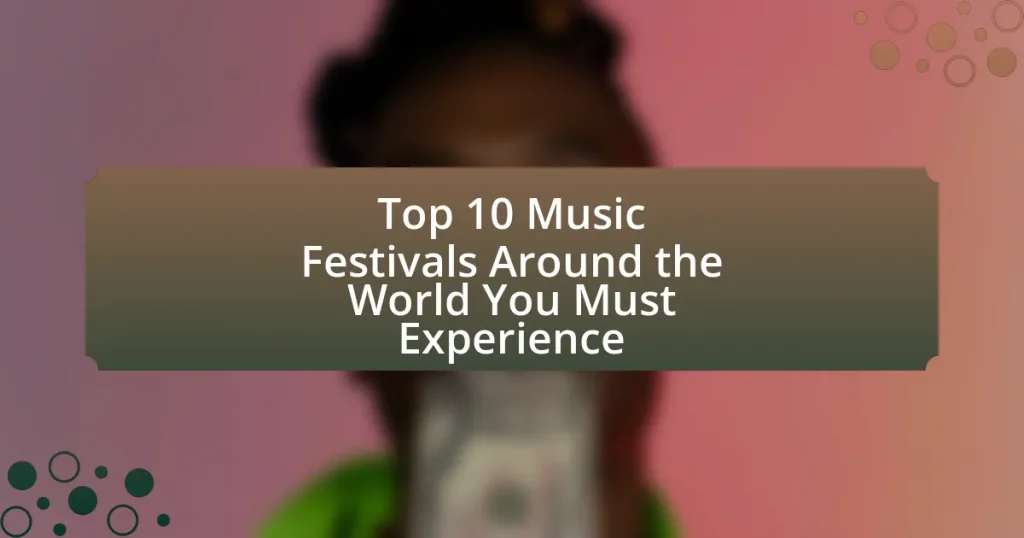The article focuses on the top 10 music festivals around the world that are essential experiences for music lovers. It highlights notable festivals such as Coachella, Glastonbury, Tomorrowland, and Burning Man, detailing their unique features, cultural significance, and the diverse genres they represent. Additionally, the article discusses the importance of music festivals in fostering community, their economic impact on local areas, and the role they play in promoting artists. Key considerations for festival-goers, including preparation tips and strategies for maximizing enjoyment, are also addressed.

What are the Top 10 Music Festivals Around the World You Must Experience?
The top 10 music festivals around the world that you must experience are:
- Coachella (USA) – Known for its diverse lineup and celebrity attendees, Coachella attracts over 250,000 visitors annually.
- Glastonbury (UK) – This iconic festival features a wide range of genres and has been running since 1970, drawing around 200,000 attendees.
- Tomorrowland (Belgium) – A premier electronic dance music festival, Tomorrowland hosts over 400,000 fans each year and is renowned for its elaborate stage designs.
- Lollapalooza (USA) – Founded in 1991, Lollapalooza has expanded globally and attracts around 100,000 attendees in Chicago alone.
- Burning Man (USA) – This unique festival focuses on community and self-expression, with around 70,000 participants gathering in the Nevada desert.
- Rock in Rio (Brazil) – One of the largest music festivals in the world, Rock in Rio hosts over 700,000 attendees across multiple days.
- Sziget Festival (Hungary) – Held on an island in Budapest, Sziget attracts around 500,000 visitors and features a diverse lineup of international artists.
- Fuji Rock Festival (Japan) – Set in a scenic mountain area, this festival draws around 100,000 attendees and showcases a mix of genres.
- Austin City Limits (USA) – This festival features over 100 acts across eight stages and attracts around 75,000 fans each day.
- Montreux Jazz Festival (Switzerland) – Established in 1967, this festival is one of the most prestigious in the world, attracting around 250,000 visitors annually.
These festivals are celebrated for their unique atmospheres, diverse lineups, and significant cultural impact, making them must-visit events for music lovers.
Why are music festivals important in today’s culture?
Music festivals are important in today’s culture because they serve as significant social and cultural gatherings that foster community, creativity, and expression. These events bring together diverse groups of people, promoting inclusivity and shared experiences through music. According to a report by the Eventbrite, 95% of festival-goers believe that music festivals create a sense of community, highlighting their role in social bonding. Additionally, music festivals often showcase a variety of genres and artists, contributing to the cultural landscape and influencing trends in music and fashion. This cultural impact is evident as festivals like Coachella and Glastonbury attract hundreds of thousands of attendees, generating substantial economic benefits for local communities.
How do music festivals influence local economies?
Music festivals significantly boost local economies by generating revenue through tourism, hospitality, and local business engagement. For instance, a study by the National Endowment for the Arts found that music festivals can attract tens of thousands of visitors, leading to increased spending on accommodations, food, and entertainment. In 2019, the Coachella Valley Music and Arts Festival contributed approximately $403 million to the local economy of Indio, California, showcasing how such events can create jobs and stimulate economic growth. Additionally, local vendors often see a surge in sales during these festivals, further reinforcing the positive economic impact on the community.
What role do music festivals play in promoting artists?
Music festivals play a crucial role in promoting artists by providing a platform for exposure to large audiences. These events attract diverse crowds, allowing artists to showcase their music to potential fans, industry professionals, and media representatives. For instance, festivals like Coachella and Glastonbury have historically launched the careers of numerous artists, with many gaining significant recognition and increased sales following their performances. Additionally, the collaborative environment of festivals often leads to networking opportunities, further enhancing an artist’s visibility and career prospects.
What criteria were used to select the top 10 music festivals?
The criteria used to select the top 10 music festivals include factors such as artist lineup quality, festival atmosphere, location, attendee experience, and historical significance. These elements are assessed through audience feedback, expert reviews, and attendance statistics, ensuring a comprehensive evaluation of each festival’s impact and appeal. For instance, festivals like Coachella and Glastonbury are often highlighted for their diverse lineups and immersive experiences, which contribute to their high rankings in various festival lists.
How does the festival’s location impact its popularity?
The festival’s location significantly impacts its popularity by influencing accessibility, cultural relevance, and local attractions. Festivals situated in major cities or tourist destinations tend to attract larger crowds due to easier transportation options and the presence of complementary activities. For instance, events like Coachella in California benefit from the area’s established tourism infrastructure, drawing attendees not only for the music but also for the surrounding attractions such as art installations and outdoor activities. Additionally, the cultural context of a location can enhance the festival’s appeal; for example, the vibrant atmosphere of Rio de Janeiro during Carnival amplifies its global recognition and attendance. Thus, the interplay between location and festival characteristics directly correlates with its popularity.
What genres of music are represented at these festivals?
The genres of music represented at these festivals include rock, pop, electronic, hip-hop, country, jazz, and folk. Major festivals like Coachella showcase a diverse lineup featuring artists from these genres, while events such as Glastonbury highlight rock and alternative music. Additionally, electronic music festivals like Tomorrowland focus primarily on EDM, and country music festivals celebrate country artists. This variety reflects the broad spectrum of musical tastes and cultural influences present at these global events.
What unique experiences do these festivals offer attendees?
These festivals offer attendees immersive cultural experiences that blend music, art, and community engagement. For instance, events like Coachella in California provide a platform for diverse musical genres and art installations, creating a vibrant atmosphere that encourages social interaction and artistic expression. Similarly, Tomorrowland in Belgium features elaborate stage designs and themed areas, enhancing the sensory experience for participants. Additionally, festivals such as Glastonbury in the UK emphasize sustainability and local culture, offering workshops and activities that promote environmental awareness. These unique elements contribute to a memorable experience that goes beyond just music, fostering a sense of belonging and shared enjoyment among attendees.
How do festival activities enhance the overall experience?
Festival activities enhance the overall experience by providing immersive engagement and fostering community connections among attendees. These activities, such as live performances, interactive workshops, and cultural showcases, create a dynamic atmosphere that encourages participation and enjoyment. For instance, studies show that festivals with diverse activities increase attendee satisfaction and retention rates, as they cater to various interests and preferences. This multifaceted approach not only entertains but also enriches the cultural experience, making festivals memorable and impactful for participants.
What amenities are typically available at these festivals?
Festivals typically offer a range of amenities including food and beverage vendors, restrooms, first aid stations, and merchandise booths. These amenities enhance the overall experience for attendees by providing essential services and conveniences. For instance, major festivals like Coachella and Glastonbury feature diverse food options, from gourmet meals to local cuisine, ensuring that attendees have access to quality nutrition. Additionally, clean and accessible restrooms are strategically placed throughout the venue to accommodate large crowds. First aid stations staffed with medical professionals are also common, ensuring safety and health support. Furthermore, merchandise booths allow fans to purchase festival-related items, contributing to the event’s atmosphere and providing memorable keepsakes.

Which are the top 10 music festivals you must experience?
The top 10 music festivals you must experience are Coachella, Glastonbury, Tomorrowland, Lollapalooza, Burning Man, Ultra Music Festival, Bonnaroo, Electric Daisy Carnival, Primavera Sound, and Sziget Festival. These festivals are renowned for their diverse lineups, vibrant atmospheres, and cultural significance. For instance, Coachella, held in California, attracts over 250,000 attendees annually and features a mix of genres, while Glastonbury in the UK is famous for its iconic performances and sustainability efforts. Tomorrowland in Belgium is known for its elaborate stage designs and electronic music focus, drawing fans from around the globe. Each festival offers a unique experience, making them essential for music lovers.
What makes Coachella a must-visit music festival?
Coachella is a must-visit music festival due to its diverse lineup of top-tier artists and its unique cultural experience. The festival features a wide range of genres, attracting major acts and emerging talent, which enhances its appeal to a broad audience. In 2022, Coachella hosted over 150 artists, including Billie Eilish, Harry Styles, and The Weeknd, showcasing its ability to draw high-profile performers. Additionally, the festival’s immersive art installations and vibrant atmosphere create a distinctive environment that goes beyond music, making it a comprehensive cultural event. The combination of renowned performances and artistic expression solidifies Coachella’s status as a premier destination for music lovers.
What are the highlights of Coachella’s lineup each year?
Coachella’s lineup each year features a diverse array of prominent artists across various genres, making it a significant event in the music festival calendar. Highlights typically include headlining performances from major acts such as Beyoncé, Radiohead, and Kendrick Lamar, who have all delivered memorable shows. Additionally, the festival showcases emerging talent and reunions, such as the 2019 performance by the iconic band, The Cure. The eclectic mix of genres, including rock, pop, hip-hop, and electronic music, ensures that Coachella remains a cultural touchstone, attracting a wide audience and generating substantial media coverage.
How does the festival’s atmosphere contribute to its appeal?
The festival’s atmosphere significantly enhances its appeal by creating an immersive experience that engages attendees emotionally and socially. This atmosphere is characterized by vibrant decorations, energetic performances, and a sense of community among festival-goers, which fosters a unique environment that encourages connection and enjoyment. For instance, studies show that festivals with interactive elements and engaging visuals can increase participant satisfaction and overall enjoyment, making them more memorable. The combination of music, art, and shared experiences cultivates a festive spirit that attracts diverse audiences, ultimately contributing to the festival’s popularity and success.
Why is Glastonbury considered iconic in the music festival scene?
Glastonbury is considered iconic in the music festival scene due to its rich history, diverse lineup, and cultural significance. Established in 1970, it has grown into one of the largest and most renowned music festivals globally, attracting over 200,000 attendees each year. The festival features a wide range of genres, showcasing both established and emerging artists, which contributes to its reputation as a platform for musical innovation. Additionally, Glastonbury is known for its commitment to social and environmental causes, enhancing its cultural impact and legacy within the music community.
What historical significance does Glastonbury hold?
Glastonbury holds historical significance as a site of ancient spirituality and cultural heritage, recognized for its association with early Christianity and Arthurian legends. The Glastonbury Abbey, founded in the 7th century, is believed to be the burial site of King Arthur and Queen Guinevere, which enhances its mythological importance. Additionally, the town has been a pilgrimage destination since the Middle Ages, attracting visitors seeking spiritual enlightenment. The combination of these historical elements contributes to Glastonbury’s reputation as a culturally rich location, making it a notable landmark in the context of music festivals and broader historical narratives.
How does Glastonbury support sustainability initiatives?
Glastonbury supports sustainability initiatives through various programs aimed at reducing environmental impact. The festival implements a comprehensive waste management system that includes recycling and composting, achieving a recycling rate of over 50%. Additionally, Glastonbury promotes the use of renewable energy sources, with a significant portion of its power supplied by solar and wind energy. The festival also encourages attendees to use public transport and carpooling, reducing carbon emissions associated with travel. Furthermore, Glastonbury has partnered with organizations like the Green Party and Friends of the Earth to raise awareness about environmental issues, demonstrating its commitment to sustainability.
What sets Tomorrowland apart from other music festivals?
Tomorrowland is distinguished from other music festivals by its unparalleled production quality and immersive thematic experiences. The festival features elaborate stage designs, intricate light shows, and a diverse lineup of top-tier electronic music artists, attracting over 400,000 attendees annually. Its unique themes, such as “The Book of Wisdom” and “The Reflection of Love,” create a captivating atmosphere that enhances the overall experience. Additionally, Tomorrowland’s global reach, with editions in countries like Belgium and Brazil, further sets it apart, making it a cultural phenomenon in the electronic music scene.
How does Tomorrowland create its unique thematic experience?
Tomorrowland creates its unique thematic experience through immersive stage designs, elaborate storytelling, and a cohesive festival narrative. Each year, Tomorrowland adopts a specific theme, such as “The Book of Wisdom” or “The Reflection of Love,” which influences the visual aesthetics, stage setups, and overall ambiance of the festival. The festival features intricately designed stages that resemble fantastical landscapes, complete with elaborate decorations, lighting effects, and pyrotechnics, enhancing the sensory experience for attendees. Additionally, the integration of diverse musical genres and performances from top DJs further enriches the thematic experience, making it a multi-dimensional event that captivates audiences. The combination of these elements results in a festival atmosphere that feels like a journey into a different world, setting Tomorrowland apart from other music festivals.
What are the key features of Tomorrowland’s production quality?
Tomorrowland’s production quality is characterized by its elaborate stage designs, cutting-edge technology, and immersive visual effects. The festival features multiple stages, each uniquely themed and constructed with intricate details, often incorporating large-scale sculptures and art installations. Advanced sound systems ensure high audio fidelity, while synchronized light shows and pyrotechnics enhance the overall experience. Additionally, the use of augmented reality and live streaming technology allows for a more interactive experience for both attendees and online viewers. These elements collectively create a captivating atmosphere that has made Tomorrowland one of the most renowned music festivals globally.

How can you prepare for attending these top music festivals?
To prepare for attending top music festivals, you should plan your travel and accommodation well in advance. Research the festival’s location, dates, and lineup to ensure you secure tickets and lodging early, as popular festivals often sell out quickly. Additionally, familiarize yourself with the festival’s rules and regulations, including what items are allowed on-site, to avoid any issues upon arrival. Packing essentials such as comfortable clothing, hydration supplies, and portable chargers will enhance your experience. According to a survey by Eventbrite, 70% of festival-goers emphasize the importance of preparation for a successful festival experience.
What essential items should you pack for a music festival?
To attend a music festival, essential items to pack include a valid ticket, comfortable clothing, sturdy footwear, a reusable water bottle, sunscreen, a portable phone charger, and a small backpack. These items ensure comfort, hydration, and convenience throughout the event. For instance, wearing comfortable clothing and sturdy footwear is crucial for long hours of standing and walking, while a reusable water bottle helps maintain hydration, which is vital in outdoor settings. Sunscreen protects against sunburn, and a portable phone charger ensures you can stay connected. A small backpack allows for easy transport of these essentials.
How can you ensure your safety while attending a festival?
To ensure your safety while attending a festival, stay aware of your surroundings and follow safety protocols. This includes keeping your belongings secure, knowing the location of emergency exits, and having a plan for meeting points in case you get separated from your group. According to the National Safety Council, being aware of your environment can significantly reduce risks in crowded places. Additionally, familiarize yourself with the festival’s rules and regulations, as they are designed to enhance safety for all attendees.
What tips can help you navigate large crowds effectively?
To navigate large crowds effectively, maintain a steady pace and stay aware of your surroundings. This approach allows you to anticipate movement and avoid bottlenecks. Additionally, using landmarks or designated meeting points can help you orient yourself and regroup if separated from your group. Research indicates that individuals who remain calm and focused in crowded situations are less likely to experience anxiety, which can further enhance their ability to navigate effectively.
What are the best practices for enjoying a music festival to the fullest?
To enjoy a music festival to the fullest, attendees should prioritize planning and preparation. This includes researching the festival lineup, scheduling performances, and familiarizing oneself with the venue layout to optimize the experience. Additionally, staying hydrated and wearing comfortable clothing are essential for maintaining energy levels throughout the event. According to a study by the University of California, staying hydrated can significantly enhance physical performance and overall enjoyment at events. Engaging with fellow festival-goers and participating in activities beyond music, such as art installations and food vendors, can also enrich the experience.
How can you plan your schedule to see your favorite artists?
To plan your schedule to see your favorite artists, first, identify the music festivals where they will perform. Research the festival lineups, which are typically announced several months in advance, allowing you to prioritize events featuring your preferred artists. Next, create a calendar marking the dates of these festivals and any ticket sale dates, ensuring you purchase tickets promptly as they can sell out quickly. Additionally, consider travel logistics, such as transportation and accommodation, to ensure you can attend without conflicts. For example, major festivals like Coachella and Glastonbury often attract large crowds, so planning ahead is crucial to secure your spot and enjoy the performances.
What strategies can enhance your overall festival experience?
To enhance your overall festival experience, plan your schedule in advance to prioritize must-see performances and activities. Research the festival lineup and create a personalized itinerary that includes set times, stages, and any special events. This strategy is supported by studies showing that attendees who plan their activities tend to report higher satisfaction levels, as they can maximize their time and enjoyment. Additionally, staying hydrated and taking breaks can prevent fatigue, ensuring you remain energized throughout the event.
What common challenges do festival-goers face and how can they be overcome?
Festival-goers commonly face challenges such as overcrowding, lack of amenities, and safety concerns. Overcrowding can be mitigated by attending less popular festivals or going during off-peak times, which allows for a more enjoyable experience. The lack of amenities, such as clean restrooms and food options, can be addressed by researching festival facilities in advance and planning accordingly, including bringing personal supplies. Safety concerns can be alleviated by staying in groups, being aware of surroundings, and following festival guidelines, which enhances personal security and overall enjoyment.
How can you deal with inclement weather during a festival?
To deal with inclement weather during a festival, attendees should prepare by wearing appropriate clothing, such as waterproof jackets and sturdy footwear. This preparation helps maintain comfort and safety in adverse conditions. Additionally, organizers can provide covered areas or tents to shield participants from rain or extreme sun, ensuring a more enjoyable experience. Historical data shows that festivals with contingency plans for weather, like Glastonbury Festival, have successfully managed adverse conditions, allowing events to continue with minimal disruption.
What should you do if you lose your friends at a festival?
If you lose your friends at a festival, immediately head to a designated meeting point, which is often established by festival organizers. These meeting points are typically marked on festival maps and are designed for attendees to reunite with lost companions. Additionally, use your phone to call or text your friends if you have their contact information, as many festivals have good cellular coverage. According to a survey by Eventbrite, 70% of festival-goers reported that they found their friends within 30 minutes by using these methods.
